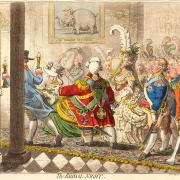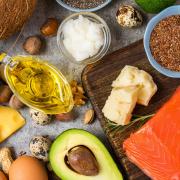Nutritional therapist Jane Famous urges you to eat the right breakfast to suit your activity and start the day firing on all cylinders

Nutritionists agree that breakfast is the most important meal of the day to give your body and brain a kick-start. What you eat can help you prepare for the day’s challenges, helping you feel sharper, stronger and more motivated.
The Stamina Breakfast for a busy person
What to eat: Porridge or raw oats with dried fruit and nuts, honey and some natural live yoghurt.
Why: You need long lasting fuel to cope with a busy day. Oats and nuts give you sustained energy, meaning that the energy from them enters the blood at a slow, consistent pace. Depending on your activity levels, a 150g bowl of porridge can energise you for three to four hours. Dried fruit, nuts and honey are concentrated calorie sources, giving you extra energy, as well as nutrients. The gut-friendly bacteria in natural live yoghurt will help maximise the nutrients you digest and aid digestion, ensuring you get the most out of breakfast.
The Sport Breakfast before a workout
What to eat: A fruit smoothie or fruit salad with bananas, mango, strawberries raspberries or blueberries. Add dried fruit such as dates or figs and grab a handful of nuts to eat after your work out for muscle building protein.
Why: If you’re going for a run or swim before work, you need lots of calories quickly. Your breakfast should also be easy to digest so you don’t feel heavy or lethargic or get cramps during exercise. A fruit smoothie gives a quick energy burst and contains nutrients needed during physical exertion. The fruit sugar in bananas enters the bloodstream quickly and fruit is a concentrated source of antioxidants and nutrients.
The IQ Breakfast for brain power
What to eat: Mackerel or poached eggs and smoked salmon on brown toast, fruit
Why: over 70% of the brain is made up of fats, which are needed for all functions including memory. Oily fish, such as mackerel and salmon, are rich in essential fatty acids, which brain cells need. Egg yolk contains lots of brain friendly lecithin. Trials have shown a lack of dietary lecithin leads to poor brain function, while extra helps ward off memory loss. Carbohydrates in fruit and brown toast make good brain fuel. During intellectual activity the brain uses up to 500 calories per hour, more than any other organ.
Breakfast drinks
TEA: If you want caffeine, opt for green or white tea. The tannin in black tea reduces the vitamin and mineral absorption, while green and white teas contain more healthy antioxidants.
COFFEE: Coffee reduces absorption of zinc and vitamin C. If you must, have a small cup 30 minutes before or after breakfast.
FRUIT JUICE: Freshly squeezed contains more nutrients than juice that comes from concentrate. Water down fruit juice to half water and half juice to stop blood sugar rising too quickly.
BETTER STILL: Redbush or herb teas, Barleycup (coffee substitute)
Jane Famous is a nutritional therapist The Natural Healing Centre, Woodbridge



























